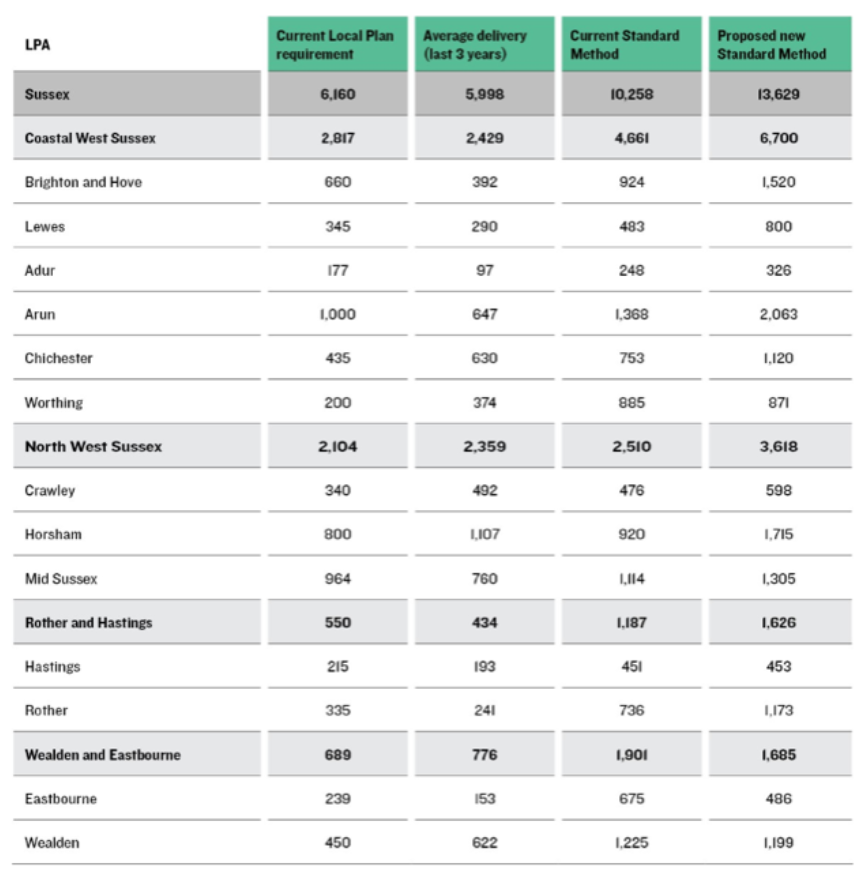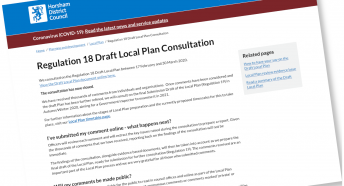Reject planning reforms which are a major threat to our countryside and communities
There are two consultations currently open relating to ‘Planning Reforms’
“Changes to the current planning system consultation on changes to planning policy and regulations’ (closing 1 October).
‘Planning for the Future, White Paper’ (closing 29 October)
Government reasons for the reforms
Developers are failing to build the mandated 300,000 homes a year. The government proposes radical reforms to the planning system to ‘cut the red tape’ to get houses built quicker and in greater numbers. However, the shortfall is not created by Local Authorities – it’s a problem caused by the failure of the development industry who increase profits, pander to shareholders, pay CEOs millions of pounds in bonuses and only build when they are sure to sell at the highest market prices, kept high by refusing to build out to create a competitive market. This strategy creates deliberate housing shortfalls for which Local Authorities are blamed.
The real problem is not that Local Authorities don’t approve development in a timely manner – it’s the dire issue of developers not building out their vast stockpile of approved sites. They are sitting on approvals which could currently create 1 million homes and solve the housing shortage.
The Challenge
CPRE is submitting robust challenges to these proposals which are an attack on any form of democracy in planning and localism. They create a tremendous threat to our countryside which CPRE, with its membership, strives to protect. They undermine the right of communities to have their say in proposed developments.
We are writing to ask you to email your MP today and make your concerns known.
In the coming weeks and months, MPs will be debating and voting in Parliament on the legislation required to put these reforms in place. The greater the pressure from members of the public, the better. We have written to Sussex MPs and asked them to take action!
Here are some of our key concerns:
1. A new flawed, formula for assessing housing targets. MP Andrew Griffiths (Arundel & South Downs) calls this a ‘mutant algorithm’ with disastrous outcomes for Sussex and our towns, villages and countryside.
2. This formula raises housing numbers required in the South and Sussex particularly, and does nothing to ‘level up’ the rest of the country. See our press release
New standard method analysis per District by Lichfields
This data is provided by planning consultancy Lichfields. Their calculations are subject to provisos issued with this document. Please consult their website for more information.
3. We are not currently building enough genuinely affordable housing https://www.cpre.org.uk/resources/viable-villages-closing-the-planning-loophole-that-undercuts-affordable-housing-in-the-countryside The proposals, if adopted, would reduce proportionally the delivery of affordable homes.
4. Contrary to what is stated in the White Paper that “The change we will see – a more engaging, equitable and effective system”, the proposals will undermine local democracy and marginalise councils.
5. Local Plans would identify just three centrally designated ‘straight jacket’ zones or types of land. Growth areas suitable for substantial development, Renewal areas suitable for ‘gentle’ development, and areas that are Protected‘
- Growth Areas
Automatic outline planning approval is to be given for ‘Growth’ area developments which have been included in a Local Plan. There’s no clarity as to how sustainability will be managed for roads, drainage, ecology or education, doctor surgeries etc etc. Once in the Local Plan the community can say goodbye to further consultation at that stage of outline approval with no input into planning applications when they come forward for local authority consideration.
Of particular concern is the removal of democratic oversight and whether designated ‘Growth Areas’ would be placed under the control of Development Corporations. In effect government-appointed quangos that would not be accountable to communities. - Renewal Areas
Whether councils would retain the right to refuse applications to develop sites that are not in the plan, and whether communities and residents would be able, as now, to actively engage in the decision-making process is far from clear. The apparent lack of clarity on this vital matter is itself cause for concern. - Protected Areas
The White Paper states that “In areas where development is restricted (Protected areas) – any development proposals would come forward as now through planning applications being made to the local authority (except where they are subject to permitted development rights or development orders), and judged against policies set out in the National Planning Policy Framework.
Such areas would include designations such as Green Belt, Areas of Outstanding Natural Beauty (AONBs), Conservation Areas, Local Wildlife Sites, areas of significant flood risk and important areas of green space.
Can we trust that such areas will really be protected? Are current protections enough?
5. Further relaxation on Permitted Development Rights – build up your property even higher – convert an inappropriate commercial building into dwellings
6. Local Plans to be produced in just 30 months with local authority penalties for not hitting deadlines. The outcome – loss of sufficient time for evidence based site evaluations and just 6 weeks for community consultation. Removal of local policies for development management.
7. Processes will be digital using a software package called ‘PropTech’. Track and trace for Covid 19 comes to mind!
8. The reforms propose development without site specific surveys which will have catastrophic consequences for biodiversity.
9..A ‘one fits all’ Infrastructure Levy set by Government with elimination of Local Authority S106 options to fund local infrastructure requirements – a charge which will inevitably have no synergy with the individuality and needs of areas. A main concern – wriggle room for developers to reduce the percentage of a development’s affordable housing,already proposed to be reduced from 30% down to 25% in these ‘reforms’
Please email your MP today to add to the growing public concern on these flawed proposals.
Download copies of the joint letters CPRE Sussex and the Sussex Wildlife trust has sent to Sussex MPs.
All downloads are PDFs.
Tim Loughton MP
Sir Peter Bottomley MP
Lloyd Russell-Moyle MP
Maria Caulfield MP Planning Reforms
Mims Davies MP
Nick Gibb MP
Nusrat Ghani MP
Peter Kyle MP
Ann Hart MP
Andrew Griffith MP
Caroline Ansell MP
Caroline Lucas MP
Gillian Keegan MP
Henry Smith MP
Huw Merriman MP
Jeremy Quin MP





